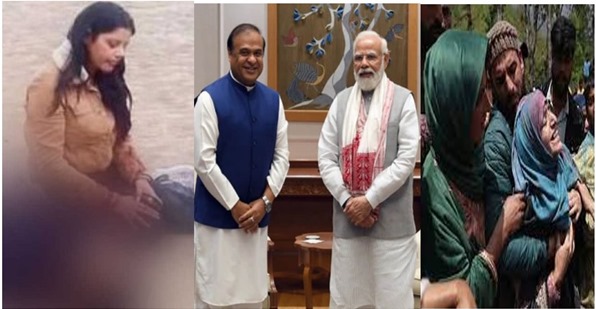How Dare you Question Modi Govt? Assam CM Himanta Jails Citizens Over Pahalgam, Pulwama Remarks
In a move that has sparked national outrage and deep concern for the state of democracy in India, at least 19 people — including a sitting MLA, a journalist, students, a lawyer, and retired teachers — have been arrested across Assam, Tripura, and Meghalaya for their remarks on the recent Pahalgam terror attack in Jammu and Kashmir, which claimed 26 lives, including those of security personnel. The arrests, many of which stem from social media posts, raise serious questions about freedom of speech, democratic rights, and whether citizens in India can still question their government without fear of imprisonment.
In Assam alone, 14 people have been arrested so far. The first was AIUDF MLA Aminul Islam, charged with sedition after he claimed that the 2019 Pulwama and 2025 Pahalgam attacks were “conspiracies by the government.” Others include journalist Md Jabir Hussain, computer science student Md AK Bahauddin from Assam University, lawyer Md Javed Mazumder, and retired teachers in Tripura like Jawhar Debnath and Kuldip Mandal. One individual, Md Musta Ahmed, was jailed for allegedly posting “Pakistan Zindabad” on Facebook. The Assam Chief Minister Himanta Biswa Sarma has warned of invoking the National Security Act (NSA), stating, “There are no similarities between Bharat and Pakistan… the two are enemy nations.”
But this crackdown has raised a disturbing question—does simply questioning the Modi government or criticizing its handling of national security now amount to sedition? Is India heading toward an era where dissent is criminalized, and the right to ask questions is seen as anti-national? Critics say the government’s response reflects authoritarian tendencies, not the behavior of a healthy democracy.
Legally, India’s Constitution guarantees every citizen the right to freedom of speech and expression under Article 19(1)(a), although with certain reasonable restrictions. However, sedition — defined under Section 124A of the Indian Penal Code — only applies when speech incites violence or public disorder. In fact, the Supreme Court, in the landmark Kedar Nath Singh vs. State of Bihar (1962) ruling, clearly stated that strong criticism of the government does not amount to sedition unless it incites violence. So, can someone be arrested just for posting a Facebook status or sharing a critical opinion online? According to the law, no — and yet, that is exactly what appears to be happening.
The broader concern is that such mass arrests send a dangerous message: that speaking out against the government may lead to jail time. This is not just about the legal validity of sedition charges — it’s about the erosion of democratic values. The use of harsh colonial-era laws like sedition and NSA against ordinary citizens creates a chilling effect, pushing people to self-censor and stay silent out of fear. When students, teachers, and elected officials are arrested simply for voicing opinions, it undermines the very foundation of democracy.
Whether these arrests are politically motivated or a result of heightened national security concerns, one thing is clear: silencing dissent is not the answer. A democracy thrives on dialogue, debate, and accountability — not fear and suppression. If asking questions is treated as a crime, then how different are we from an authoritarian regime?
Now, more than ever, it’s crucial for citizens to know their rights and to speak up — while they still can. This isn’t just about 19 arrests. It’s about the future of free speech in India.

